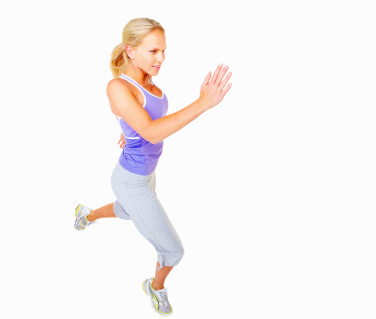Improve Running When Over 50 Years Old
by Roger
(England)

Hello,
My name is Roger age 56, I have been running for over 25 years and before this I played local footbal Saturday and Sundays in the season. 20 years ago my London marathon time was 2hrs 39mins 53secs.
I trained up to 70 mile per week back then including:
Then the other four or five days of easy to steady running and of course the long Sunday run. I was mid 30s then.
I still run today, approximately three to four days per week mainly easy to steady four or five mile runs with one day in about every two weeks of speed work on grass. I am finding my efforts are getting slower from 7:30 minute miles to 8+ minute miles, yet I still find myself puffing and panting to even do this pace.
I eat a fairly good balanced diet, but as always the case I do eat chocolate and a bit of cake. I'm thinking that because I'm more relaxed about getting out for a run (15-20 miles per week) this will just keep me fit.
But I want to get faster again and then compete in 10ks at a reasonable pace. In short, I don't want to be a jogger, but I want to be a runner like I used to be.
Am I getting tired and lazy? Is it too late to improve my running when I am well past 50 years old?
Regards
Roger
Answer by Dominique:
Hi Roger,
Great to hear from you and thank you for your question.
First of all, congratulations on a long running career to date and a fantastic marathon PB!
Are you getting tired and lazy? Don't think so. Is there still an opportunity for you to improve? Absolutely!
It's never to late to improve your running, even when you are over 50 years old.
I'd provide you with the following bits of advice, given you are a masters athlete (sounds nicer than to say that we are getting old, hey!):
1. The fundamentals remain true
2. Strength and conditioning is more important
3. Power of protein
The Fundamentals Remain True

The training you did back in the day was top notch. Two quality sessions, a long run and the rest easy running. Add to that years of consistency and you would have been a true force to be reckoned with. Your wonderful marathon PB is testament to that.
So, you know the key principles of training: consistency, a lot of easy running, long run and some quality work.
You can still apply these principles at an older age. You can still build up your mileage. You can even still do quality sessions. But you must keep in mind that you are older. So that means:
You need more recovery. Maybe you need more rest days or some cross training instead of pounding the pavement every day.
Quality sessions may need a slower ramp-up to get used to some faster running again. It would be unwise to immediately launch into a 5 x 1k or something like that. You could start with a session like 6 x 30 seconds with 90-120 seconds recovery. Slowly build from there. See how it feels. Ease off if it is causing problems. Or try some tempo running with short cruise intervals. Start at a low base, start somewhere. Then build it up.
I would recommend a slow build up of mileage using the principles of my increasing mileage safely page.
You may find that instead of two quality sessions, your body can now only really handle one per week. Or maybe three every fortnight. Some people turn the weekly 7-day cycle into a 10-day cycle, allowing for extra rest in between.
Strength and conditioning is more Important

How to stop it? Strength training. Hit the gym. Start working with a personal trainer or, if you are familiar with gym work, devise your own routine. Focus on the core and on the legs. Squats, deadlifts, leg presses, lunges. Additionally, focus on heavier weights with lower rep ranges, i.e. 5-8 reps per set.
Unfamiliar with gym work? Then I would really recommend working with a personal trainer, at least initially, to ensure you approach things safely. For the untrained athlete, you can also do a fair bit of initial strength work at home with bodyweight exercises. But to really get stronger, the gym is the place to be. For every runner, but again, especially as you get older.
Also check out the Strength Training for Runners page.
Power of Protein

Because of the decrease in muscle mass, sufficient intake of protein becomes more and more important as you get older. Make sure every main meal contains protein. And make sure to have some protein after a serious run as well.
On Sunday mornings I generally do my long run with my running group. I have an early breakfast, then go for a run. After the run it is not quite time for lunch yet. But what I always try to do is have a quick smoothie with protein powder added to it. I need to replenish and need to start repairing those muscles.
So, watch that protein intake. Sure, vegetables, fruit, healthy meals in general, but protein, protein, protein is what helps the older athlete maintain their strength.
I hope my answer provides some support and gives you an idea of what to do. It will take hard work, but there is no doubt that with a sensible, consistent approach you can get faster and fitter again!
All the best.
Kind regards,
Dominique


